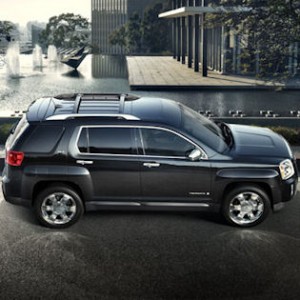 My teenage daughter, who likes to plan ahead, has decided to pick out my next new car. She insists that a GMC Terrain would be just right for me because it has plenty of space like an SUV, but it gets much better gas mileage and drives like a car, and it has interesting high-tech features. Oh, and it would look much better in black than in any other color.
My teenage daughter, who likes to plan ahead, has decided to pick out my next new car. She insists that a GMC Terrain would be just right for me because it has plenty of space like an SUV, but it gets much better gas mileage and drives like a car, and it has interesting high-tech features. Oh, and it would look much better in black than in any other color.
Her ulterior motive, of course, is that this car is what she wants to drive; and she thinks that if I buy one, she can talk me into giving it to her after a couple of years. At present she is driving a twelve-year-old clunker with high miles, so I can’t say that I blame her for trying. And because my car is even more ancient than hers, I can see why she thinks her scheme might succeed. I haven’t had air conditioning for years because my car is older than the stuff that replaced Freon. The radio buttons on the steering wheel stopped working a long time ago, and so did the CD player. When I turn the steering wheel to the left, it squeaks.
But the truth is, I like my old car. It brings back fond memories of taking my kids to preschool and to the park, all those years ago. When I went to buy my groceries last week, I was thinking how nice it was to feel the breeze through the open windows and to hear the birds singing. Even the squeaky steering wheel has become a familiar comforting sound—in much the same way that a clattering old furnace, which was next to my bedroom in a house where I lived as a child, became my reliable nighttime companion. For a long time after my family moved to another house, my bedroom seemed very quiet and lonely.
I sometimes see articles that describe autistic people as excessively resistant to change. I’m left wondering if it’s our modern society, instead, that has gotten out of kilter. The rapid pace of change in today’s world has gone far beyond anything in our history. Once upon a time, our ancestors could expect to spend their whole lives in the same small village, using the same tools, walking the same paths, observing the same customs, and seeing the same faces. These were the conditions under which the human species evolved. What surprises me isn’t that some of us have trouble coping with today’s vastly different society, but that we haven’t rebelled en masse against the unreasonable demands of a busy noisy consumer culture in which nothing is ever good enough.
It’s not just autistics who cling to the familiar and who feel unsettled by change. Although my daughter is quite fond of shopping and social events, she still sleeps with a favorite stuffed animal that she’s had since she was a toddler. My husband’s parents won’t move away from the house where their children grew up, even though the neighborhood is seriously in decline and my father-in-law has some trouble climbing the stairs now that he is older. The political scene in recent years has reflected widespread anxiety about change, with conservatives decrying the breakdown of traditional society and liberals worrying about how to preserve the natural environment.
Majia Holmer Nadesan, a professor at Arizona State University West, suggests in an article entitled Constructing Autism (which is a summary of her book by the same name) that the very concept of autism itself arose out of modern society’s profound anxieties about cultural and environmental change. During the twentieth century, she argues, the characteristics that we now call autism were recast in pathological terms as people began to worry that their children might be harmed by mysterious environmental factors or might not measure up to the expectations of a changing society. The idea of autism could not have existed at any other time in history, she contends.
It’s a provocative argument; and as we navigate the uncertain roads toward the future, we should indeed take care not to project our anxieties onto the next generation.
Gwen McKay on 06/30/10 in featured, Society | No Comments | Read More

